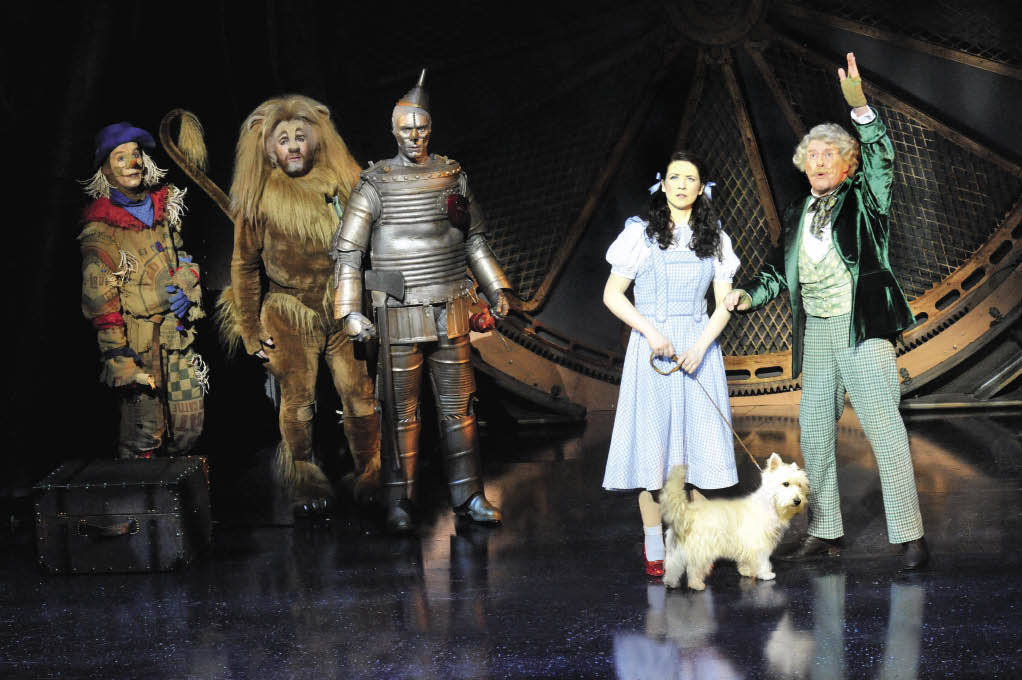The pantomime, we’re often told, exists in no culture but Britain’s. Maybe we should look a bit harder. The Wizard of Oz is a children’s fantasy, epic in form, comic in idiom, populated by folksy stereotypes, which uses the metaphor of a journey to present a mythical clash between good and evil. It ends with order restored and virtue triumphant, and with the characters discovering that self-knowledge and wisdom are more valuable than the illusory contentments of wealth or power. All that’s missing is some bad acting and a few painfully ribald puns.
The pantomime, we’re often told, exists in no culture but Britain’s. Maybe we should look a bit harder. The Wizard of Oz is a children’s fantasy, epic in form, comic in idiom, populated by folksy stereotypes, which uses the metaphor of a journey to present a mythical clash between good and evil. It ends with order restored and virtue triumphant, and with the characters discovering that self-knowledge and wisdom are more valuable than the illusory contentments of wealth or power. All that’s missing is some bad acting and a few painfully ribald puns.
Andrew Lloyd Webber and his director Jeremy Sams have treated the classic to an affectionate spruce-up and brought it into the London Palladium. Is it good? Certainly. Is it brilliant? Not quite.
It starts promisingly. Robert Jones’s designs of Kansas are ethereally lovely with deep foreshortenings that create an austere and ghostly beauty. A new song amplifies the material here but it doesn’t add much. Then along comes the tornado. A superb effect. It rips and rages across the theatre almost too scarily (a mother’s hand reached out to console the tremors of a five-year-old just ahead of me), but when the show comes to earth in Oz the garish colourings are a disappointment. A muddle of pastel effects is laid out beneath a corny blue sky and an obvious rainbow. Thankfully, the Emerald City is done with imaginative boldness and the design here regains a sense of majesty and grandeur.
The music, of course, can’t fail to delight, although it’s striking how banal and flavourless many of the lyrics are. ‘If ever oh ever a wiz there was/ The Wizard of Oz is one because/ Because, because, because, because, because/ Because of the wonderful things he does.’ What does that mean? Not a scrap. Not a jot. And yet it steals into our minds and sets up home there permanently because the melody is fashioned from heavenly stuff.
The role of Dorothy is played by Danielle Hope, winner of a TV talent contest, who is very young and very new to all this and who has been generously described as perfectly good by most critics. Which she is. Sweetness and a clear singing voice are all she can reasonably be asked to deliver. As for reproducing the sacred innocence of Judy Garland, she might as well try to convince us she’s Spartacus or Basil Fawlty. It’s a shame she’s constantly upstaged by her dog.
Her three goofy pals are done decently enough, too, although none of them quite manages to ensnare our hearts. That honour goes to Hannah Waddingham, the Wicked Witch of the West, who grabs the show and makes it hers without disturbing its overall equilibrium. Waddingham is a blonde stunnah who transforms herself into a gnarled and crooked spirit of malice by slapping green gunk all over her cheeks and gluing a humdinger of a nose on to her face. The effect is completed with a chin the size of a shovel. Lloyd Webber and his collaborator Tim Rice, aware of her talent, have given her a bespoke rock number, ‘Red Shoes Blues’, in which she explores her character’s vengeful passions and Gothic sexuality with such exhilarating athleticism that the song threatens to overwhelm the blameless niceness of the show’s other components. Sir Tim’s lyrics, cheekily inventive, are as good as his best work. ‘She’s pretty. She’s clueless,’ hisses the Wicked Witch, ‘and I want her shoeless.’
Her rapacious malevolence is neatly balanced by the charm and beauty of Emily Tierney’s Glinda. Between them they make a much bigger splash than Michael Crawford, who barely registers in the anodyne roles of Professor Marvel and the kindly old Wizard. He also plays a tour guide and a doorman. It’s as if he hasn’t got anything else to do in his dressing room and wants to keep popping back to remind us he’s still here. This is a fine version of the 1939 classic and, although it can’t quite replicate the magic of the movie, it comes close enough.
At the Arts Theatre, there’s a curious and innovative show about sex. Part lecture, part improvised experiment, A Guide to Sexual Misery is performed by Wolfgang Weinberger, who uses his audience as a focus group for questions about relationships. His stroke of genius is to get the cross-examinees to answer by humming. This makes the answers anonymous and, hopefully, honest. ‘Women, do you want a partner who’s more intelligent than you?’ Loud hums. ‘Same question to the men.’ Silence. The show starts late and runs at weekends only. A perfect after-dinner digestive. But don’t take your spouse unless you’re planning to split up.






Comments